Global Warming Linked to Syrian Refugee Crisis
Air Date: Week of September 11, 2015
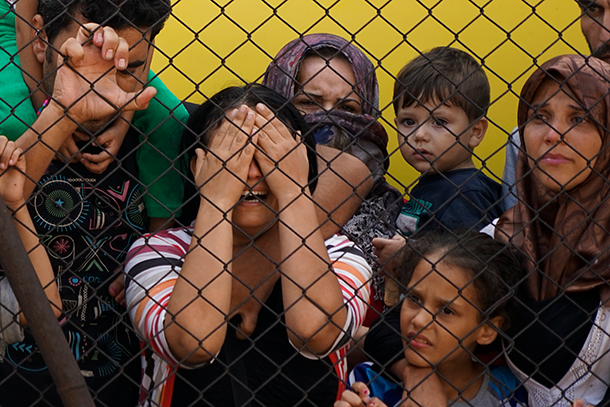
Syrian women and children at a Budapest train station in Hungary on September 4th, 2015. (Photo: Mstyslav Chernov, CC BY-SA 4.0)
As refugees from the civil war in Syria pour into Europe, we take a look at the role climate change is playing in that crisis as well as the exodus from North Africa across the Mediterranean. Host Steve Curwood speaks with Marc Levy, deputy director of the Center for International Earth Science Information Network at Columbia University about the current refugee crisis and the future of climate-related conflicts and migrations.
Transcript
CURWOOD: It's Living on Earth, I'm Steve Curwood. As the humanitarian crisis linked to the civil war in Syria unfolds, millions of refugees are stuck in bleak camps in the Middle East, with hundreds of thousands battering at the gates of Europe. Thousands more displaced by drought in Africa are also risking death to find new homes and new lives. President Obama is among those who see links between climate disruption and these disasters. He addressed the Coast Guard Academy in May.
OBAMA: (I) understand, climate change did not cause the conflicts we see around the world. Yet what we also know is that severe drought helped to create the instability in Nigeria that was exploited by the terrorist group Boko Haram. It’s now believed that drought and crop failures and high food prices helped fuel the early unrest in Syria, which descended into civil war in the heart of the Middle East.
CURWOOD: It's a contentious claim that strikes a chord with Mark Levy, a national security consultant who teaches at Columbia University. I asked him what grade he’d give the President for his statement.
LEVY: I would probably give it an A minus. I think to categorically say that we cannot assign causality to climate change for any of the conflicts that we see is a misrepresentation. I think a more accurate portrayal would be that the evidence is now overwhelming that climate change is responsible for a significant amount of the political violence that's taking place around the world, however there's uncertainty about the exact relative magnitude of that contribution in combination with other causes, and there is uncertainty about which of the cases of conflict have an ironclad causal link to climate change. A lot of people have a hard time accepting the fact that our ability to maintain order is dependent in part on the weather. We would like to think that we are more civilized than that and whether or not we start killing and hurting each other doesn't depend on the temperature and the rain, but the scientific evidence is that it does depend in part on those things.
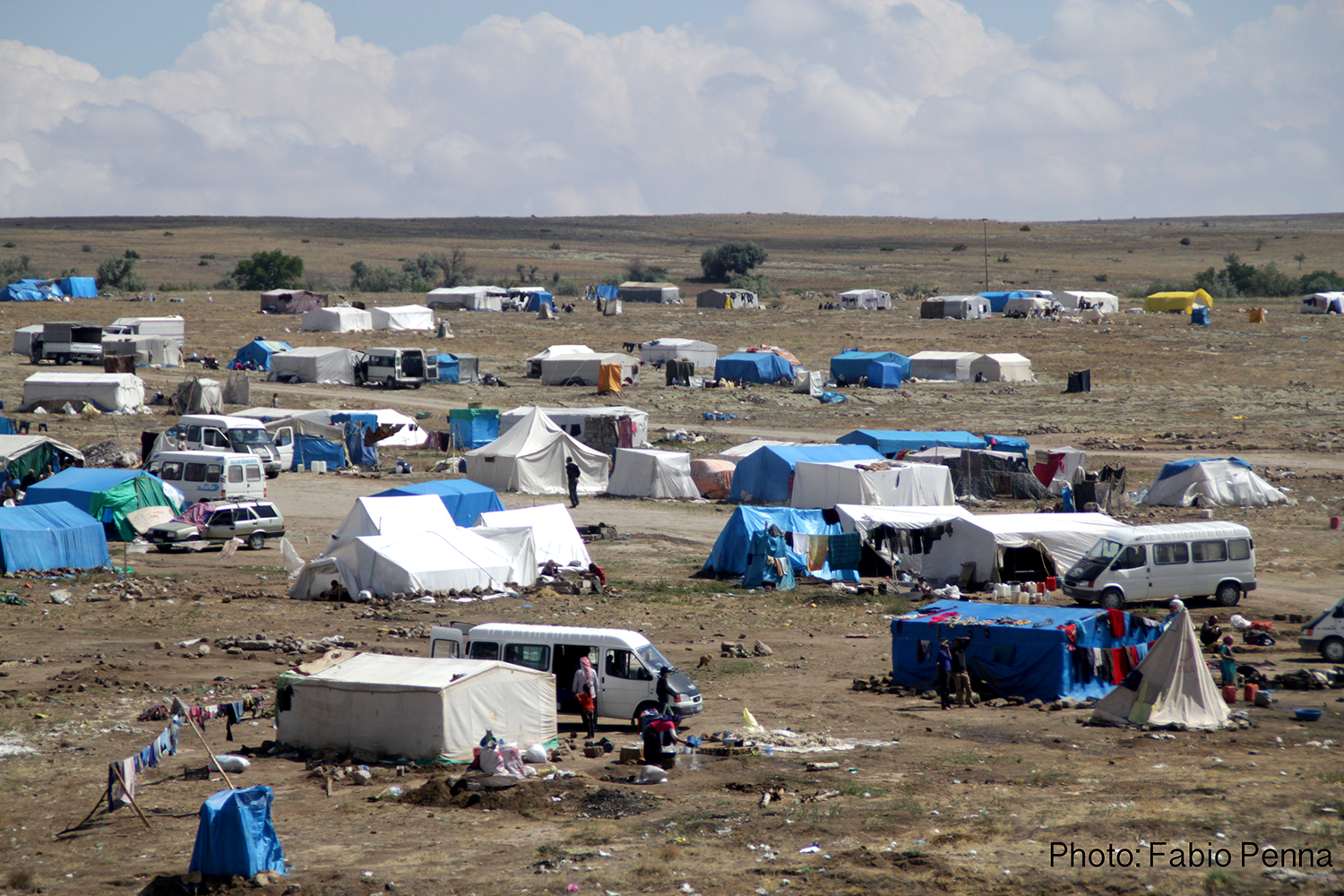
A refugee camp in Turkey. (Photo: Fabio Penna, CC-BY-ND 2.0)
CURWOOD: Mark Levy says the problems of refugees, violence and global warming form a complicated nexus that have profound impacts on national security. And in his view, the US intelligence agencies woefully underestimated how powerful an effect the changing climate could have on political stability in Syria.
LEVY: We have known for some time that the eastern Mediterranean is a region that is at high risk from climate change. In this particular case in the last decade what's happened is you've had a combination of elevated temperatures and lower precipitation and river flow that have combined to destroy crops and kill livestock and make it difficult for cities and villages to get drinking water. These effects compound over time; if you lose a bunch of your crops one year and next year you also lose a bunch or the same thing with livestock, then you push societies closer to critical thresholds where they can get to the point where they feel like they cannot survive where they are and they have to move. And this is what happened in Syria. We had large numbers of people desperate enough that they took up and relocated and this contributed directly to the grievances, the challenges maintaining order, and combined with the virtual complete lack of responsiveness on the part of the government, led many people to feel they have no choice but to rise up against the government.
CURWOOD: Mark, obviously the immediate violence of a brutal civil war is the primary driver of people leaving their homes. Of course, they are also economic issues involved, so how fair is it to raise the question of climate change in this context?
LEVY: This is a question that gets debated quite a bit. It has applications for how you assign responsibility within the international community because we have a treaty that governs obligations towards refugees fleeing for reasons of political persecution; we don't have treaties in place for people fleeing for economic reasons. The massive exodus from Syria occurred after the regime dramatically escalated the persecution of people who were peacefully protesting, and that led to an escalation towards a civil war. So in the present case, there's no question about the nature of the obligation of the international community has. This is a case of refugees fleeing the circumstances of political violence in which they have a well-founded fear for their lives. That doesn't mean that climate change is off the hook because climate change did play a major role in creating the conditions that made that war more likely.
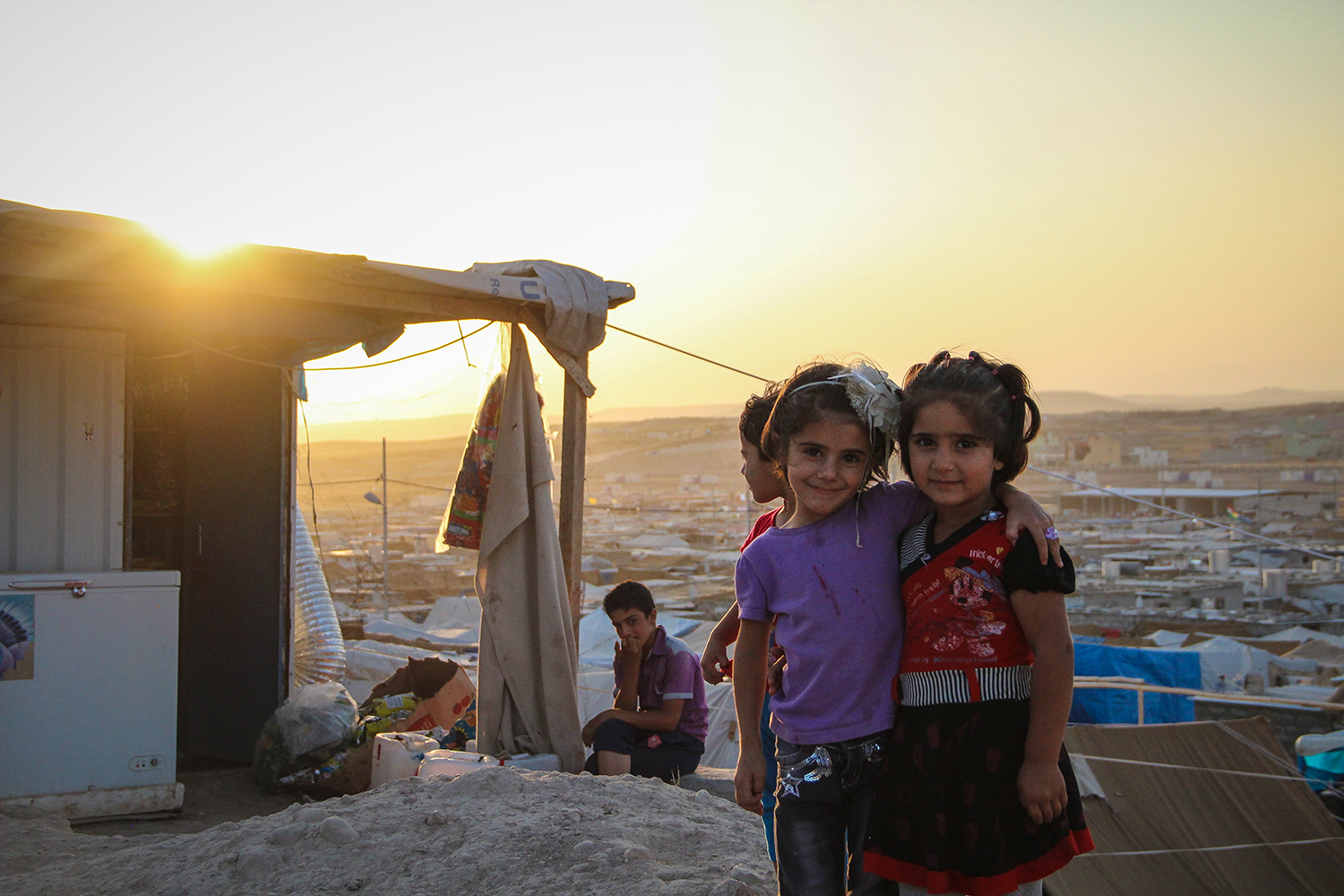
Two Syrian children at a refugee camp in Iraq. (Photo: European Commission DG ECHO, CC BY-ND 2.0)
CURWOOD: Now, where else in the world are we seeing climate change forcing migration? What about the Sahel region of Africa for example?
LEVY: The question of where climate migration is taking place is a very sensitive topic, but there was a big round of drought and famine in the Sahel in the 70s and 80s. One place that was hit really hard was Mali and it's very clear that you had disruptions to the migration patterns in Mali as a consequence of those droughts, and some of those migrants were nomadic communities that went into Libya and were trained as mercenaries by the Gaddafi regime. Many of those people ended up coming back into Mali in the last decade and were part of the coalition that overthrew the government. If you mismanage climate stress politically and socially you have dangers that could show up in complicated ways and sort of as a boomerang, you know when it finally comes back and hits you, it may be both surprising and catastrophic.
CURWOOD: What about right here in the United States? I'm thinking of people getting displaced by storms like Hurricane Katrina?
LEVY: Yeah, we know that extreme events - storms, droughts, fires and so on - they displace people, that's one reason that we worry about them. Katrina displaced a lot of people. Superstorm Sandy displaced a lot of people. So within the US, when people do assessments of what does climate change mean for Americans, this effect is a very large one because we have a well established long-standing sense that people should not be forced to leave their homes involuntarily under such circumstances and when they do it's a clear sign of failure. When I was working with the Intergovernmental Panel on Climate Change a few years ago following a decision by the IPCC to take a look at the security implications of climate change, something that they have never done before, I was surprised to discover that some of the clearest cases where climate change is triggering loss of human security right now in ways we can see were within the US, and that was in the Arctic communities that were facing major disruption in their habitats including to the point where you have entire towns facing the need to relocate because the permafrost was thawing and the local environment was becoming uninhabitable.
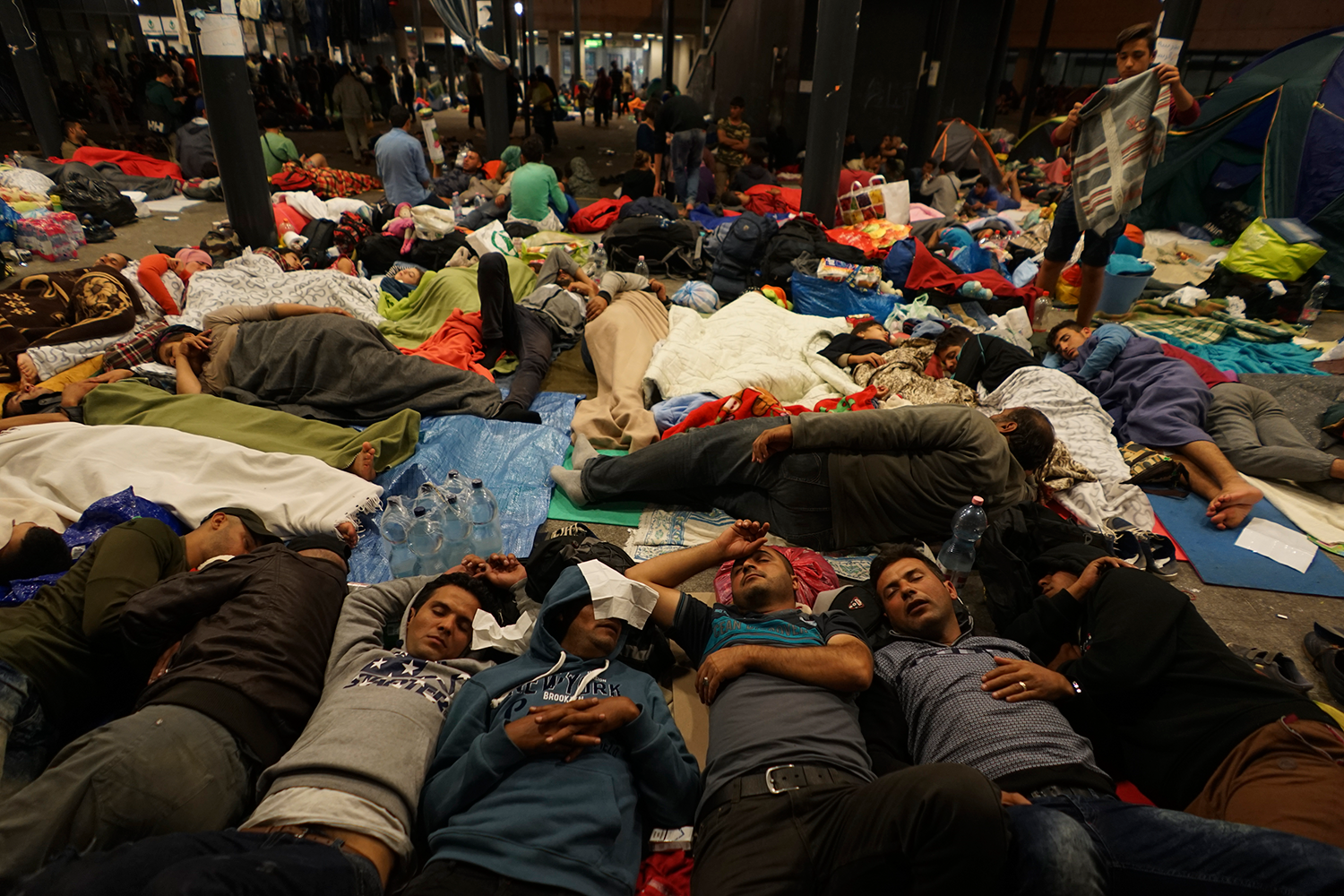
Syrian refugees sleeping on the floor of a railway station in Budapest (Photo: Mstyslav Chernov, CC BY-SA 4.0)
CURWOOD: So the science suggests that climate disruption is only going to get more intense in the decades ahead. So what impact will that have on migration and refugee issues do you think?
LEVY: Well, in the course of a decade or two we don't actually know what lies ahead. There's natural variation around a long-term trend, and there are global cycles that could put us into a period of more normal climate for a little while. That's a possible future, we can't rule that out, but when you look at the trends over the last 10 years, what I see and when I think many people are experiencing intuitively is the exact opposite of that best case scenario. We seem to be in the middle of the combination of trends that are worse than we ever imagined, and so if those trends continue we are going to be in for really alarming conditions in the next decade. And politically and economically and socially, the trends are also very bad. We have for the first time since 1990 an increase in the number of internal wars going on globally. This uptick started about five years ago and it caught a lot of people by surprise. People had been thinking we were reaping this peace dividend. People like Stephen Pinker were writing books about how we've licked this problem of massive organized political violence and now what we're seeing is that optimism was premature or misplaced and we have the largest number of refugees ever since World War II, over 50 million, the first time we've crossed that threshold, renewed concerns about international warfare with Russia and Ukraine. So the world is looking more dangerous not less dangerous and so if we adopt the metaphor that many people are using of climate as a threat multiplier, then what you got going on is that the baseline that you're multiplying against is also going up, and so then the product is quite scary.
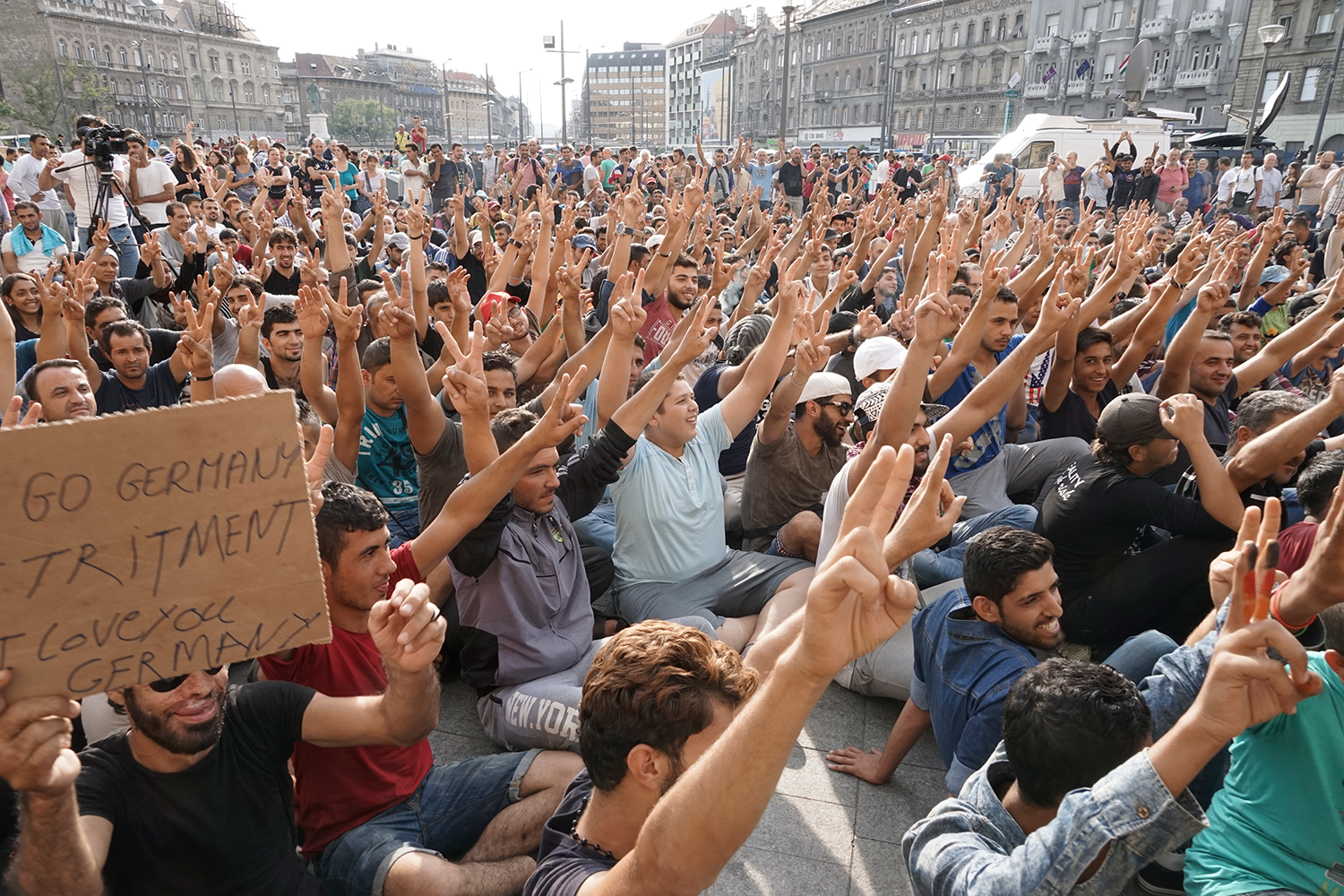
Syrian refugees striking on the platform of Budapest Keleti railway station in Hungary on September 4th, 2015. (Photo: Mstyslav Chernov, CC BY-SA 4.0)
CURWOOD: Mark, what needs to be done here in United States and around the world to prepare better for increased displacement linked to climate change?
LEVY: The acknowledgement that we face a new kind of threat is necessary, but by itself it accomplishes nothing. So what we need to do is start putting in place the processes that will enable us to anticipate these kinds of risks and therefore be able to prepare for those kinds of risks and either prevent them from getting bad, or when they erupt, dampen how badly they can escalate. It requires getting all the agencies of the US government, just to take the US case, working together and it requires connecting all the dots, the agriculture, the economics, the demographics, the climate, the water, the energy and so on. So somebody has to be regularly putting these pieces together and looking for potential danger zones, and then the final key piece which has been dramatically underinvested in, is that we have to do deep dives into places that look like they might be very dangerous, and to do what in the financial world they called stress testing where we imagine an extreme risk and we ask, “how will the society respond?” So in the Syria case what we should've been doing is imagining an unprecedented drought and then thinking through how society would respond, how the Assad regime would respond and where things would go from there, and nobody in any position of authority was either doing that or asking other people to do that.
CURWOOD: Mark, to what extent do you see what's happening now in the Mediterranean as a turning point?
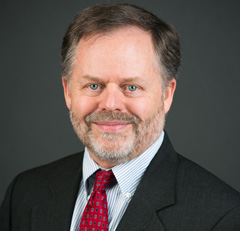
Marc Levy is deputy director of the Center for International Earth Science Information Network at Columbia University. (Photo: Columbia University)
LEVY: I hope it is a turning point. People hoped that the Darfur genocide was going to be a turning point, and it wasn't. We need to acknowledge that something new is happening and that we need to change the way we anticipate and respond to these kinds of problems. Whether or not the Mediterranean crisis is a harbinger of more generalized global insecurity triggered by climate change is a question that we have the ability to shape the answer to. The security consequences of climate stress are always preventable, they are not inevitable. There are certain things that climate change will do that we can't prevent. If the oceans acidify, a lot of the coral will die and there's probably nothing we can do about that, but refugee situations, civil wars, displacement, deprivation...these things are all preventable. This could easily be a turning point in a positive direction in which we knowledge the threat and rise to the occasion or it could be a place where we moved away from peace and prosperity and descended into a period of insecurity and deprivation.
CURWOOD: Mark Levy is the Deputy Director of the Center for Earth, Science and Information Network at Columbia University. Thanks so much for taking the time with us today.
LEVY: Thank you.
Links
Living on Earth wants to hear from you!
Living on Earth
62 Calef Highway, Suite 212
Lee, NH 03861
Telephone: 617-287-4121
E-mail: comments@loe.org
Newsletter [Click here]
Donate to Living on Earth!
Living on Earth is an independent media program and relies entirely on contributions from listeners and institutions supporting public service. Please donate now to preserve an independent environmental voice.
NewsletterLiving on Earth offers a weekly delivery of the show's rundown to your mailbox. Sign up for our newsletter today!
 Sailors For The Sea: Be the change you want to sea.
Sailors For The Sea: Be the change you want to sea.
 The Grantham Foundation for the Protection of the Environment: Committed to protecting and improving the health of the global environment.
The Grantham Foundation for the Protection of the Environment: Committed to protecting and improving the health of the global environment.
 Contribute to Living on Earth and receive, as our gift to you, an archival print of one of Mark Seth Lender's extraordinary wildlife photographs. Follow the link to see Mark's current collection of photographs.
Contribute to Living on Earth and receive, as our gift to you, an archival print of one of Mark Seth Lender's extraordinary wildlife photographs. Follow the link to see Mark's current collection of photographs.
 Buy a signed copy of Mark Seth Lender's book Smeagull the Seagull & support Living on Earth
Buy a signed copy of Mark Seth Lender's book Smeagull the Seagull & support Living on Earth

